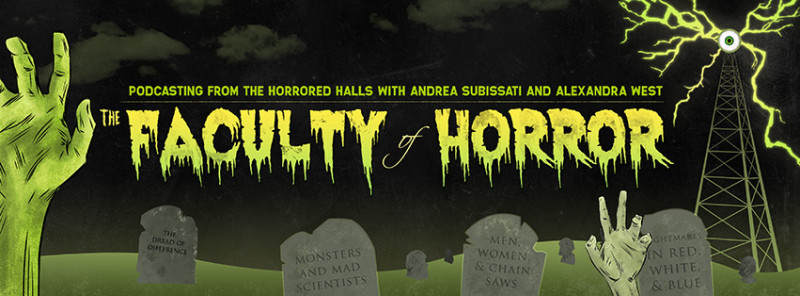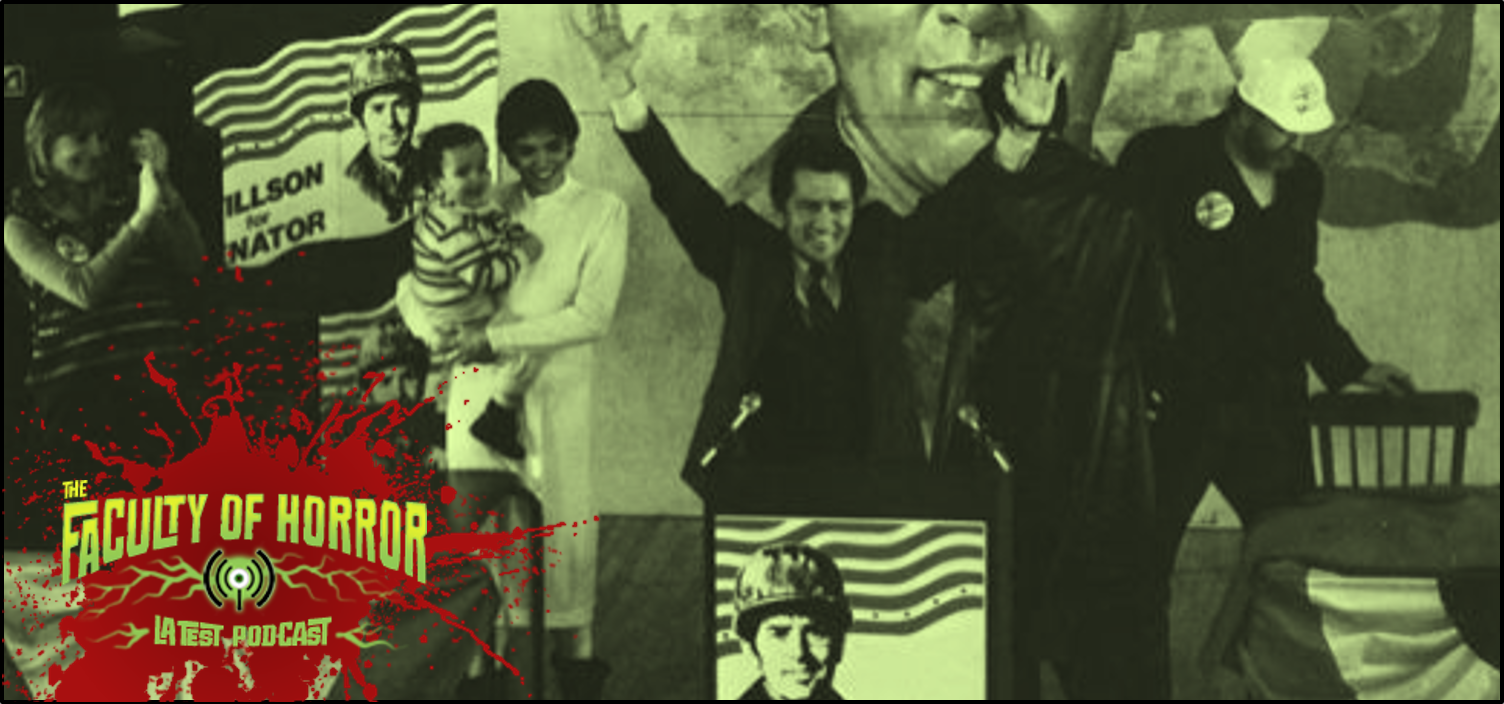SURPRISE! We’re back with a bonus episode to help you get through Election Day and the ensuing aftermath by talking about David Cronenberg’s The Dead Zone. In this episode, we delve into notions of fate, time travel paradoxes, cults of personality, the responsibility of the individual, and the importance of a good wool coat.
The Fack Dispatch – Subscribe to our monthly newsletter!
REQUIRED READING
The Dead Zone. Dir. David Cronenberg, 1983.
EXTRA CREDIT
The Witches Are Coming. Lindy West’s essay collection written in response to the rise of Trump.
David Cronenberg, Debra Hill and Martin Sheen interviews. Interviews from the release of the film complete with great fashion and chain smoking.
The Philosophical Problem of Killing Baby Hitler, Explained. Vox’s explanation of the grandfather/Hitler paradox.
A Cult of Personality Can Derail Democracy. Why it’s important to recognize the danger of the track we’re on.
LISTEN
Right click or option-click here and choose “Save Target As”
Podcast: Play in new window | Download


We sat and listened on election day before polls closed. Wit, intelligence, honour and humanity were added to my election day tribulations. Quite brilliant by these two glorious women.
Great episode, I’ve always loved The Dead Zone (the book, the film, and the tv series.) I always enjoy listening to these incredible and intelligent ladies and it’s very insightful to hear someone who is not an American’s point of view of the insanity of this administration. As an American, I watched the Dead Zone again recently and it is eerily prescient for its time. I truly fear what could happen to this country if “he” gets another term.
Another awesome and well-timed episode. A lovely gift – thank you! For the record, I’m with Alex on Christopher Walken!
I wanted to re-listen before this “part B.” I really appreciated the comparative discussion of the states supposed separation of powers versus the parliamentary model of governing. My “emotional support Canadian” who emigrated from here to there in 1990 has me sold on the parliamentary model. We’ll if the citizenry here can recover (and grow) but I am doubtful. After witnessing caravans of pickups with dumpster flags and almost punching out a guy with a flag who was blocking our downtown ATM, i’ve seen enough of America. I’ve been trying to change it from the inside (even locally) since Ronald Reagan started the destruction of the country. I and many others seem to have failed. Anyway, thanks again for this thoughtful episode.
I’m an American listener, and I don’t want all the things you want. I’m fine listening to people I disagree with though, and I hope the same is true for you. I also didn’t vote for President, because I live in Chicago and my vote doesn’t matter. I don’t see Stillson as an analogue for Trump, even if he is someone that came out of nowhere to become President, because Stillson saw some important destiny for himself in starting WW3. Trump only cares about flattering his own ego, and has actually opposed his own Defense Department when they pushed for more intervention. The same stakes aren’t around with the Cold War over. George W. Bush was a far worse President than Trump due to the Iraq war alone, but that mostly just killed Iraqis & soldiers & raised the price of oil rather than actually disrupting things much back home (which is why so many of the people responsible for it haven’t learned their lesson).
You used the word “bipartisan” to mean the opposite of its actual meaning (cooperation between opposing parties). And the lack of legislation passing doesn’t mean that “checks and balances” have been eroded, rather the opposite. Slowing down change has always been the intent. And indeed the checks and balances have inhibited Trump, although him being lazy & incompetent played a large role as well.
You also don’t seem to understand the purpose of the U.S Constitution. It established a federal government, and then because critics of it objected that the new government might violate the rights we had fought for, a Bill of Rights was added. The individual U.S states were restrained from doing a small number of things like printing their own currency & conducting their own foreign policy, but otherwise had their “police powers” only restrained by their own state constitutions. The federal government restricting what state governments could do is more a phenomena following the Civil War and the “Reconstruction amendments” (although even those had had much less effect early on than they would during later generations). Most of the issues you have brought up are not actually inter-state (like pollution crossing from one state to another), but could instead be handled on a state-by-state basis without any new amendment on a federal level. It is the case that Americans are increasingly ignorant of who is even making policy at the state/local level, as responsibility has trickled up toward the federal level and away even from Congress. David Schleicher’s proposed “solution” to this problem is to prohibit the same parties running at the local level so people won’t just be relying on how they nationally affiliate to reason about local politics, but that’s unlikely to happen.
You note that post-modernism is popular only among some academics, but there what Gerald Crayon (@zermatist on Medium) has dubbed “heretical” versions of it which have spread out into the wider world and gotten popular even if an academic might not think those passed muster or maintained an internal consistency.
You’d really be throwing away your life if you exchanged it for a constitutional amendment on gay marriage, because the Supreme Court always declared it constitutionally required. They like to make up parts of the Constitution when the amendment process doesn’t go through the formality of actually occurring.
From the outside, Smith seems like a maniac: he’s going to commit a public political assassination because he had a vision of the future. We in the audience are supposed to side with him, but in his own way he’s something of a reflection of Stillson (who also thinks he must take a radical action nobody else would understand). Your notion of whether he would still do this if he had his own family reminded me of Bryan Caplan’s post “I’m Too Busy Fighting Tyranny to Feed My Family”. Of course, the conclusion of that is that we should have open borders, which is a bit off-topic, but he does mention Von Stauffenberg’s plot against Hitler as an exception to his generalization of one’s proper priorities.
Rather than reading an entertainer like Lindy West who has no incentive to develop an accurate understanding of electoral politics rather than flattering the sensibilities of her audience, you might try reading an actual political scientist like Andrew Gelman or sociologist like Musa al-Gharbi. But since you will face no consequences for having an inaccurate understanding of U.S politics, you really don’t need to.
I don’t see The Dead Zone as making a systemic critique. Stillson himself really does seem to be the big problem, which is why Smith is justified in thinking that killing him would solve it.
I’ll be honest, I had been assuming the outro music would be something from D.O.A, possibly “World War 3”.
Awesome (and harrowing) discussion! I like Alexandra’s idea about Johnny being the antithesis of an incel. While Andrea’s point about whether Johnny would’ve made the sacrifice if he had the wife, kids, house and everything was apt. It really gets to a fundamental question about how our society champions the idea of putting family first above all, even for the common good, which screws up so many Americans.